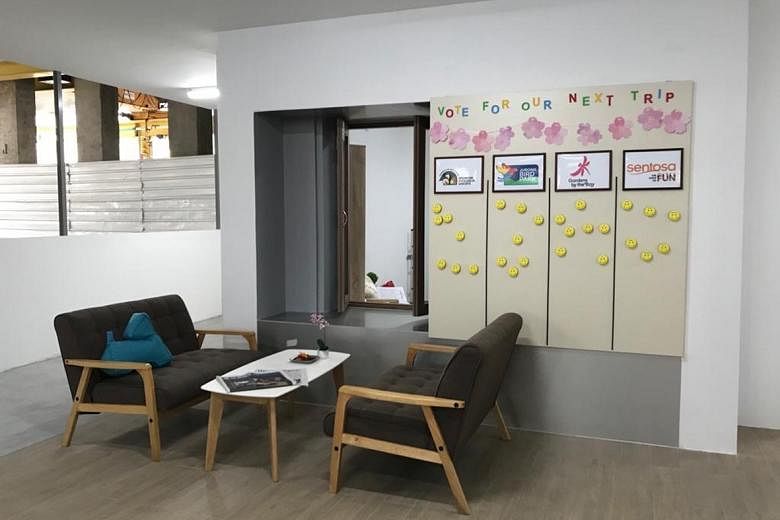SINGAPORE - A new type of serviced Housing Board (HDB) home for seniors, where residents can ask for help if they need it but remain independent, will be rolled out in Bukit Batok in May, as more projects are being tested here to give people the option to age at home.
These assisted-living flats come with a mandatory package of services, comprising 24/7 emergency response and an on-site community manager who will facilitate social interaction and referral to care services.
The units will be located in one block, and there will be communal spaces and facilities on every floor, where seniors can socialise.
"The community manager will monitor the health status of residents, and link them up with relevant care services according to their needs," said Senior Minister of State for Health Amy Khor in Parliament on Thursday (March 5), during the debate on the ministry's budget.
"The community manager will also curate programmes to foster a stronger sense of neighbourliness, and residents can look forward to mingling at the communal spaces on every floor - much like the good old kampung days."
The flats are meant to provide those aged 65 and above with a housing option for independent living, with care available if needed, and a "gotong royong spirit among neighbours", she said.
National Development Minister Lawrence Wong first announced the plan for these assisted-living flats in Parliament a year ago. He said that when a person opts for assisted living, he is not just buying a flat, but also a package of care services tied to that flat.
In the year since then, the Ministry of Health and the Ministry of National Development conducted 14 focus group discussions with seniors, service providers and healthcare professionals. These sessions were held at specially constructed mock-up flats and communal living room.
Seniors who are single and living alone were particularly keen on the concept.
The participants gave very specific feedback that included putting in a movable partition between kitchen and sleeping areas, room for a full-sized fridge, and more, Dr Khor noted.
"We took in all the feedback, and improved the design of the housing units, communal living room and basic service package," she said.
"We are also exploring additional care service options to support frail seniors, such as after-hours care."
Dr Khor said that priority for some units will be given to seniors with care needs, and more details will be available in the coming weeks.
The flats will be sold in a build-to-order tender, with planning for a similar pilot in the private sector also under way.
These assisted-living flats help seniors to age in place and fill a critical gap in senior housing needs in Singapore, said Associate Professor Fung John Chye, the director at the Centre for Ageing Research in the Environment at National University of Singapore's School of Design and Environment.
"At the moment, you either stay at home or you go to a nursing home. There's a need for something in between."
An assisted-living concept allows the senior to be cared for at home in familiar surroundings. Potential basic care services such as help with bathing or feeding or taking the elderly to the hospital for their check-ups can help them continue to live as independently as possible at home.
There are other senior public housing projects here, such as two-room flexi-flats and Kampung Admiralty in Woodlands, but they do not come with a service package.
Kampung Admiralty brought together senior public housing with healthcare, wellness and eldercare facilities, and is the first HDB project to co-locate childcare and senior centres in one integrated development.
With the new assisted-living flats, there appears to be more focus on social interaction.
"One of the key challenges among older people is social isolation. They self-isolate themselves at home and that has an impact on their mental state. This concept could be one step to address this," said Prof Fung.
As Singaporeans become more affluent, they also demand more privacy in their living space. Hence, the introduction of communal spaces on each floor is worth exploring, he pointed out.
While the hardware is there, the focus needs to be on the software as well.
"You do need people in the community to take ownership of the space. Otherwise the space will be appropriated by one or two persons or be underutilised," said Prof Fung.
"We don't know the details yet. For instance, can they build a fish tank or bring their sofa there? Are the residents allowed to maintain it?"
To be successful, such spaces must also cater to intergenerational use, said Prof Fung.
Otherwise, there's also the risk of the project being seen as a geriatric enclave.
Some people will find assisted-living flats appealing while others may want a retirement village type of assisted-living arrangement.
For instance, at the private assisted-living facility St Bernadette Lifestyle Village in Bukit Timah, residents pay for services that include breakfast and laundry services. They get their own room and share the living and dining rooms.
"Our needs are not static. The young-old, they are more educated, they have demands for different lifestyles, so there's a need for more diverse offerings," said Prof Fung.
All these new developments will help meet the need for more diverse senior housing options in a fast ageing society, he said.


